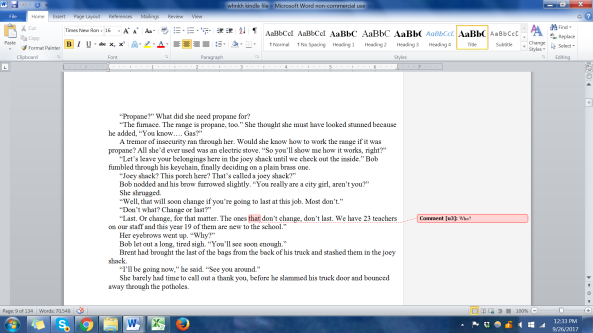
From the first draft to the second last, my writing partner and I send chapters back and forth. We ask questions, make suggestions, point out errors in time lines, holes in plot lines, identify discrepancies in character development, and highlight the great bits.
Finally, we come to the second last draft—the one that requires the scrutiny for details. Our goal is always to have a “clean” manuscript.
My writing partner puts the chapters into one document, sends it to me, and I send it to my Kindle.
Why?
I’ve learned that reading on the Kindle puts me in “book” mode and I see the things I miss on the big screen. Note that this draft is already formatted for ereaders so I’m seeing what the buyer will see. Periods in the wrong place, a word that just doesn’t work, “is” when it should be “it,” and a couple of times I spot a missing word that needs to be added, or an extra word to be deleted.
I find a few “that” where I think it should be “who.” I make note of them and my writing partner emails back.
Just now I was looking up when to use who and that. It's okay to use that for a person, animal, or thing. The criterion has more to do with whether it's a restrictive clause or not (whether the antecedent is named and whether the sentence can stand without the whole clause).
As far as I can tell from that, it's okay to use "that" in those cases where I have used it. It's a complicated thing though.
I see this sentence, Dad had moved to Regina to teach high school there. I comment,
I think at some other point, her dad was teaching in a college not high school.
I bookmark each page that needs attention on my Kindle and then go back to the computer copy to add my notes with Track Changes. No, I don’t scroll through pages and pages to find the one I need. I pick an unusual word on the page I’ve bookmarked and then use Find to get to the right page on the computer.
I send the file back to my writing partner. She writes, “I went through your suggestions. I had found some of them but missed others, so thank you!”
I offer to read it one more time, but she declines. I know she’ll go through it one or two more times. Our goal is to have an error free document and we get it right most of the time. After all, two heads are better than one.
www.darlenejonesauthor.com
No comments:
Post a Comment